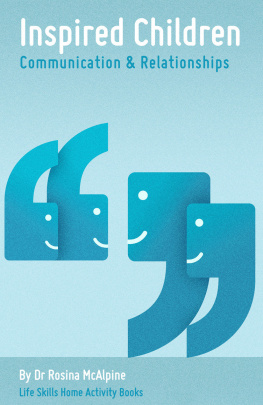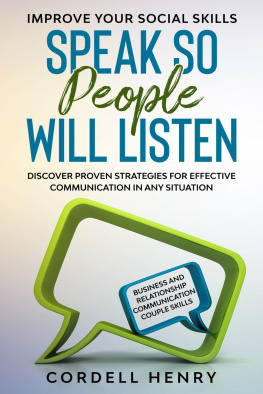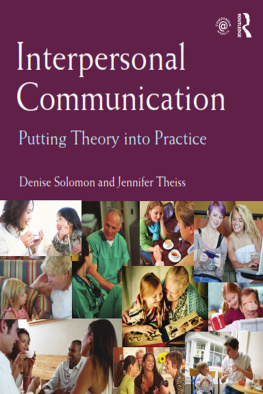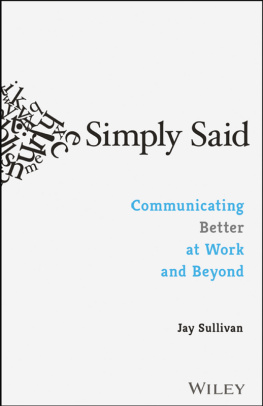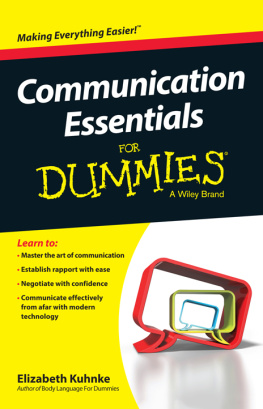Introduction
Have you ever felt like you failed miserably when you try to communicate? If so, then you definitely need this book. It is filled with the research that you need to communicate effectively. Remember that communication takes on many different forms both verbal and non-verbal. It is vital to understand both forms before you try to communicate. After you have mastered the techniques in this book, you will be better able to deliver your message.
As we take the journey through this book, you will learn many new things and be reminded of other things that you already know. You will learn the questions that you need to ask in order to communicate effectively. Much of your success in communicating effectively is based on your self-confidence so we have provided tips to help you develop the confidence that you need.
Communication is about much more than simply exchanging information. You must understand the emotions and intentions behind that information. You must be able to convey your message so that it is fully received and understood exactly as you intended. However, you must also be able to listen and gain the full meaning of the information being given to you so that other people feel heard and understood. Lack of these skills can be barriers between you and others that continue the cycle of misunderstandings, frustrations and conflicts. You will be warned about these barriers to effective communication and how to overcome them..
Everyone has to communicate in a variety of situations. Therefore, this book explores how to communicate at networking events including things you need to do before, during and after those events. At some point, almost everyone must give a presentation. Yet many people are afraid of giving a presentation, so we provide you with important tips that make giving those presentations easier. Not all communication is verbal so we will help you to conquer the art of letter writing.
Unfortunately, not all messages are positive. At some point, you will need to give a hostile message to someone. Following the techniques outlined in this book allows you to make sure that your message gets through.
It is important that your body delivers the same message as your words. Therefore, you need to conquer the art of gesturing, body language, eye contact and personal appearance.
Effective communication will help you to strengthen your relationships with others. It will improve your ability to work with a team, make decisions and solve problems. Having effective communication skills will enable you to present all information, even the negative or difficult messages, without creating conflict or destroying trust. It really is the glue that holds everything together.
Many people believe that because they can speak it means that they can communicate effectively. However, effective communication is a learned skill. Despite that, it is much more effective when it is spontaneous rather than when delivered by rote. For example, if you are giving a speech and simply read it from the notes you've made it will rarely have the same impact as if you appeared to deliver it 'off the cuff'. It takes time and effort to develop your skills and become an effective communicator. However, the more effort and practice you put in, the more natural your communication skills will become.
Come on this journey with us!
Overcoming Obstacles
Before you can improve your communication skills, you must know what obstacles you may encounter and need to overcome. This is what this chapter will address while the following chapters will help you to improve on the skills you may already possess.
Say what you mean. That sounds so simple, doesn't it? But it's easier said than done. It may be a clich, but it's a clich for a reason. All too often what we are trying to communicate gets lost in translation, no matter our intentions.
For example, you are quitting your job and you tell your boss that you think you must hand in your two weeks notice. Now your intent is to tell your boss that you are handing in your two weeks notice. However, your boss hears that you are only thinking about handing in your notice.
Do you see what happened there? In this scenario, you failed to communicate properly that you were quitting and your boss simply thought you were letting him know you were unhappy with the way things were. This is a scenario that you set up that will cause frustration and conflict between you and your boss.
So how do you fix this? You fix it by improving your communication skills and recognizing the barriers to effective communication.
Barriers to Effective Communication
Stress . When you are stressed or overwhelmed emotionally you are more likely to misunderstand other people. This leads to you sending confusing or off-putting nonverbal signals and falling into poor patterns of behavior. This in turn can lead to conflicts of varying degrees from confusion to vehement arguments. If you find this happening, you need to take a moment or two so that you can calm down before continuing the conversation.
Lack of focus . If you are multitasking, you aren't able to communicate effectively. You will miss vital nonverbal cues in the conversation if you are planning what you are going to say next, checking text messages, thinking about other tasks you have to do or even daydreaming due to boredom or disinterest in the topic of discussion. It is imperative that you stay focused on the experience as it is happening.
Inconsistent body language . Your nonverbal communication should reinforce what you are saying, not contradict it. As an example, you cannot say 'yes' to something while frowning or shaking your head 'no'. Having conflicting verbal and nonverbal communication will probably make your listener feel like you are being dishonest.
Negative body language . This may seem like it is part of inconsistent body language but it really isn't. If you really disagree with what is being said, it will show if you are not very careful. Perhaps you dislike the person conveying the message, that too can show through in your nonverbal cues. The most common forms of negative body language are crossing your arms, tapping of fingers or feet and avoiding eye contact. However, it can be something you don't even realize you are doing; such as, heaving sighs, eye rolling, or even making tsking sounds. You don't have to agree with what is being said or like the person saying it. However, in order to communicate effectively, you must be able to listen without making the other person defensive. To do this, you must avoid sending negative signals.
People often focus on what they should say. Effective communication is more about listening than talking. When you listen well, you will not only understand the information being offered but will also understand the emotions the speaker is communicating.
There is a difference between simply hearing what is being said and engaged listening. When you are engaged with what is being said you will hear the subtle tones of the speakers voice. Hearing those tones will tell you how the speaker is feeling and the emotions they are trying to convey. You will make the speaker feel heard and understood which will help to build a stronger relationship between you and the other person.




